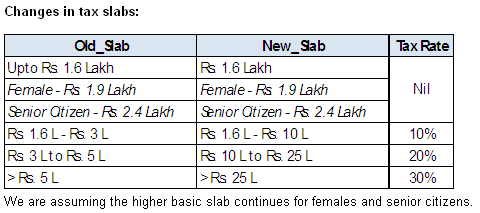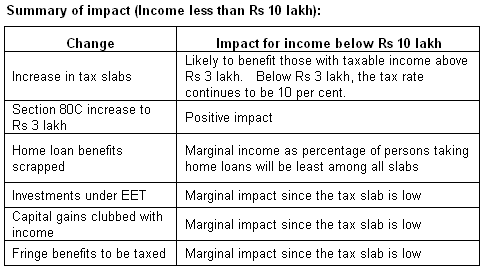
2009 continues to be an eventful year. More so for the salaried taxpayer as a new set of tax code is likely to kick in after April 2011. While it is early days yet to figure out how this new taxation system will impact the tax outgo of salaried class here's a brief analyses.
The proposed new tax code is as big as any announcement made by Dr Manmohan Singh's government so far and reflects a paradigm shift in the thinking on taxes.
What has also surprised is the speed of the announcement of the tax code; so quickly after the poll verdict and the date for implementation is April 2011. The tax code and its implications are welcome measures for the salaried person, and one hopes it will increase compliance from business people as well.
The most fascinating aspect of the new tax code is that it will divide the salaried class into three broad categories for taxing their income as shown in the table below.
In the first part of a three-part series we focus on the impact for those having taxable income of up to Rs 10 lakh:

Here's how the new tax code will impact those earning between Rs 1.6 lakh to Rs 10 lakh per annum.

The limit u/s 80C is currently Rs one lakh and the new tax code proposes to increase it to Rs 3 lakh. And that certainly is good news.
Now for the bad part: the code further proposes to implement the exempt-exempt-taxable (EET) regime for the taxation on savings.
However, the silver lining is that only new contributions on or after the commencement of this code will be subject to EET.
For instance, any returns coming from avenues like PF, PPF and insurance which is currently exempt will be taxed on maturity.
The other negative is that the avenues under Section 80C are likely to be significantly pruned.

Tax benefit of up to Rs 1.50 lakh against home loan interest payment is all set to go.
This was a huge benefit for people in the higher income brackets. For those who took home loans more for the tax benefit than for the actual home itself this is going to be a major disappointment.

A paradigm shift is proposed as part of the draft code with respect to capital gains.
All capital gains would be taxable at normal rates of tax, removing the benefits of lower rates. However, the fair market value substitution date which was earlier considered as April 1, 1981 will now be April 1, 2000.
With the proposed abolition of securities transaction tax, exemption / lower tax for capital gains tax on sale of shares on stock exchange is withdrawn.
This is likely to have a low impact on persons with income less than Rs 10 lakh considering that the tax rate is pretty low for this segment.
However, if capital gain is significant and it pushes you into the subsequent tax slabs, this is going to be a dampener.
To understand this better let us see from the table below how Ram, Shyam, Hemant and Santosh will pa tax under the new tax code that is likely to kick in after April 2011:

While Ram has no difference in taxes to be paid as he continues to be in the same slab, Shyam is the only person ending up having to pay higher tax.
Removal of the home loan benefit has cost him dearly. He has already been unable to use the Section 80C in the old slab itself and considering his income, he is unlikely to be able to do so since he already has a home loan outstanding.
Hemant who has no tax savings at all benefits from the lower tax rates.
For Santosh, the higher benefit under Section 80C offsets the loss of benefit on account of home loan.
